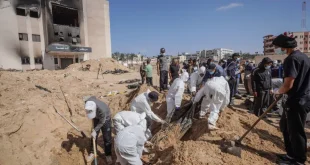By Palestine Chronicle Editors
Despite lofty claims that Israel is ready to fight for years to come, simple discourse analysis, along with even simpler logic, tells us that this is not the case.
The Israeli Army Radio reported on Wednesday that Israel’s own military assessment has concluded “that the land operations in Gaza will last for another month.”
This assessment, reported by Al-Jazeera, coincided with reports in US media that the Israeli war on the besieged Gaza Strip will carry on until early January.
“US officials expect the current phase of Israel’s ground invasion of Gaza targeting the southern end of the strip to last several weeks before Israel transitions, possibly by January, to a lower-intensity, hyper-localized strategy that narrowly targets specific Hamas militants and leaders,” CNN reported quoting multiple senior officials.
This raises many questions, lead among them: Why did Israel fail to eliminate any prominent Resistance leader in the first 60 days of the war? In fact, why would it need another 30 days, or so, before the Israeli army even enters into the phase of eliminating the leadership of the Resistance?
Weeks, Months, Years?
This is quite puzzling because Israel, and everyone else, understands well that this is an asymmetrical warfare, and that the Resistance leadership is not permanently located in a fixed place.
Aside from the continued confusion of the Israeli narrative regarding the war, one is forced to contend with another question, why one more month?
On November 30, Israel’s Defense Minister Yoav Gallant said that Israel will likely take months to win the war in Gaza. “We are going to fight Hamas until we prevail — no matter how long it takes,” he said during a meeting with US Secretary of State Antony Blinken.
This emphasis on months – or years as other Israeli officials claimed – is most likely aimed at sending a message to the Palestinian Resistance that the Israeli military operation, and subsequent genocide in Gaza, will carry on unabated until the Resistance is eliminated.
But another target audience is the Israeli public itself, which is yet to see, even early signs of Israel’s military, even strategic, objectives being met.
It is important to recall that on November 8, Israeli military spokesman Daniel Hagari had already declared victory in northern Gaza. “Hamas has lost control and is continuing to lose control in the north,” he said.
That turned out not to resemble any version of the truth, however exaggerated.
Aside from the Khan Yunis area, in southern Gaza, most of the Resistance’s well-documented battles are still taking place in northern Gaza, close to the Israel-Gaza border.
Why One Month?
But why did Israel allocate a month to supposedly defeat the Resistance in Gaza?
One, the fact that US officials are also providing similar time estimations suggests that Israel has received a green light from Washington to do whatever it pleases in Gaza for at least one more month.
Two, to sell the idea, to its own public, that the Israeli army is following a clear blueprint, a strategy towards a specific goal, and supposedly an imminent victory.
This argument is strengthened by the constant references by the Israeli military that it moved from stage one, to stage two, and then stage three of the war, without providing any concrete evidence that these stages have been fulfilled.
Three, to climb down the high ladder that Israeli leaders have climbed in the beginning of the war, that of making lofty promises, not only of defeating the Resistance but determining the very future of Gaza, in fact of the Palestinian people though their military performance in a single war.
Four, then, there is the mathematical impossibility.
Hardware Deficit
Citing Israeli defense information, AXIOS said that Israel has nearly 2,200 tanks.
Other sources say that 1,750 of these tanks are combat-ready.
And of course, these tanks are distributed equally between north, south, center, and the eastern borders of the country, namely the Jordan Valley region.
It is important to keep in mind that many of these tanks are positioned in the porous Israel-Sinai border, and that also many have not entered the war on Gaza to secure the so-called Gaza Envelope.
According to claims by Palestinian Resistance, again supported by video evidence, Israel has so far lost between 400 to 500 Israeli military vehicles, most of which are Merkava tanks.
A simple mathematical equation demonstrates that Israel simply does not have the military capability of sustaining its hardware losses in the battlefield for months to come, let alone years.
In fact, as early as November 19, the Israeli news source Calcalistech reported that the Israeli military has halted exports of its most advanced Merkava tanks to Europe due to the war in Gaza.
Other sources spoke about Israel’s decision to incorporate older Merkava models to make up for its heavy military losses in Gaza.
Israeli propaganda aside, logic tells us that the fate of Israel’s military operation in Gaza will be determined in the next few weeks, and that Israel’s allies, especially those in Washington, know this well.
Palestinian Resistance is, too aware of this fact, and seems ready and prepared for all possibilities.
(The Palestine Chronicle)
 Sri lanka Muslims Web Portal Diversity and Inclusiveness
Sri lanka Muslims Web Portal Diversity and Inclusiveness



